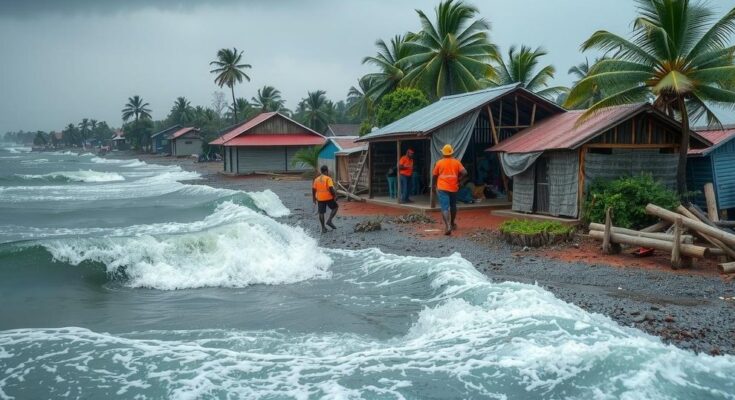The recent landfall of Cyclone Chido in Mozambique has led to a rising death toll of 120, with 868 individuals injured and over 680,000 affected. Extensive damage has occurred in northern provinces, displacing families and damaging homes, schools, and healthcare facilities. The government has established emergency shelters, while authorities seek support for immediate relief efforts in response to this crisis.
The death toll from Cyclone Chido, which struck northern Mozambique, has tragically increased to 120. In addition, the cyclone has left 868 individuals injured and adversely affected over 680,000 residents as reported by Mozambique’s national disaster relief agency. The cyclone made landfall on December 15, causing significant devastation in the provinces of Cabo Delgado, Nampula, and Niassa through substantial rains and floods.
Officials have confirmed that Cyclone Chido has impacted more than 123,000 families, equating to approximately 622,610 people, and has partially or completely destroyed over 140,000 homes. The crisis has also severely affected educational and health infrastructures, with over 150,000 residences, 250 schools, 89 public buildings, and 52 health facilities either destroyed or damaged, impacting nearly 110,000 students.
In light of the displacement caused by the cyclone, the government has initiated the establishment of emergency shelters, which currently house around 1,349 individuals. The National Institute for Disaster Risk Management and Reduction (INGD) has underscored the significant consequences of Cyclone Chido on the sectors of education and health, affirming the necessity for resilient planning to mitigate future disasters. After originating over the southwestern Indian Ocean on December 5 and first impacting Mayotte, Cyclone Chido has now left a considerable mark on Mozambique.
Government authorities and international humanitarian organizations are actively appealing for support to meet the immediate needs of displaced and affected communities following this disaster. The urgency of the situation has prompted discussions regarding the vulnerability of social infrastructures amidst climate change and the importance of preparedness against such climatic events.
Cyclone Chido, which formed in the southwestern Indian Ocean, made a devastating landfall in Mozambique on December 15, following its earlier impact on Mayotte. The cyclone’s intense rainfall, storms, and subsequent flooding have highlighted the precariousness of the affected regions, particularly Cabo Delgado, Nampula, and Niassa provinces. Such tropical cyclones are characterized by their low atmospheric pressure and circular wind patterns, often resulting in significant destruction when they strengthen. As they develop, they can impact social infrastructure and community wellbeing, especially in regions with less robust preparedness for natural disasters.
In conclusion, Cyclone Chido has resulted in severe loss of life and extensive damage in northern Mozambique, underscoring the need for improved disaster readiness and resilient infrastructure. The rising death toll and the substantial number of individuals affected emphasize the urgency of international support and intervention in the aftermath of this natural disaster. The call for enhanced planning against the impacts of climate change remains critical as the affected communities strive to recover and rebuild.
Original Source: www.socialnews.xyz




